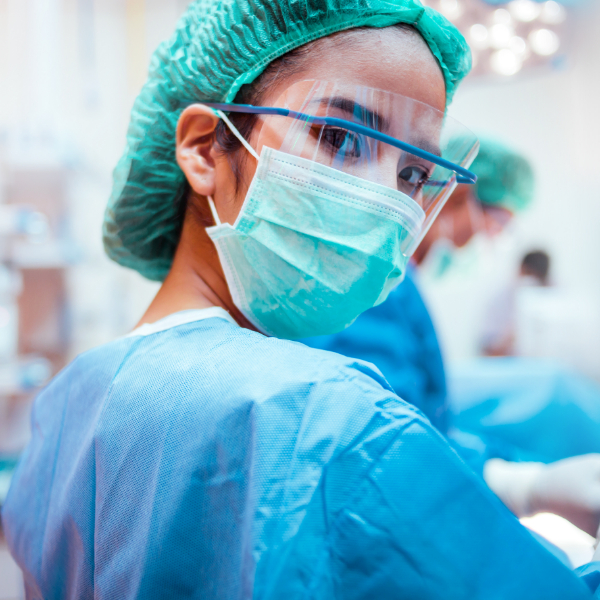Infection Prevention and Control in Hospitals
HAIs are one of the primary reasons for various illnesses. Here’s a short guide on why infection control is essential and some crucial standard precautions to prevent infections in hospitals.
Hospital-acquired infections (HAIs) significantly burden health care costs worldwide. However, HAIs are more than just additional healthcare costs; they can easily cause irreparable bodily harm, increase healthcare costs and even cause death.
Over the past years, hospitals have become increasingly aware of infection control and prevention. Medical facilities worldwide are adopting additional measures to prevent, control, and stop the spread of infections, particularly Covid-19.
Why Is Infection Control So Important
Infection control is extremely crucial as there has been a rise in HAIs. Accordingly to WHO, 7% of all patients admitted into healthcare facilities contract at least 1 HAI.
In January 2021, NHS England estimated that 18% of Covid-19 cases were hospital-acquired, and 1 in every 8 hospitalized Covid-19 instances resulted from HAI.
To mitigate against any infection risks in the hospital, healthcare professionals are advised to perform the following Standard Infection Control Precautions (SICPs).
Standard Infection Control Precautions By Hospitals
Here are some basic infection control precautions that should be adopted by every hospital to prevent, control, and stop the spread of infectious diseases.
-
Wash Your Hands
Hand washing is the foundation of reducing the HAIs risks. Therefore, every hospital staff member and the people in the facility should wash hands with warm water and soap or antibacterial hand wash for at least 20 seconds.
This process should be repeated several times daily, especially before drinking, eating, or providing care.
While hand washing is encouraged, if it is not possible, then using a simple, fast, and effective hand sanitizer is also an excellent hygiene solution in hospitals.
-
Infection Control Policy
A specific, relevant, applicable, and well-structured infection control policy will inform which patients have the highest risk of contracting or passing HAIs.
The policy should clearly state when patients should be isolated and steps for preventing contact with other patients and staff.
-
Identify Contagiousness ASAP
Highly contagious infections should be identified as soon as possible. For example, any patient admitted with diarrhea should be immediately tested for infections. Similarly, people with respiratory issues should be tested for the flu.
-
Infection Control Awareness
Hospital staff should be able to identify common infections and immediately act to prevent their spread in the hospital. However, this will be only possible if they frequently receive essential and recurring infection control awareness education.
-
Gloves & Hand Sanitizers
Health care professionals should always wear gloves when in contact with patients. Sanitary staff should also wear gloves when changing patients’ sheets, emptying trash, etc.
In addition to gloves, hospitals should ensure the 24/7 availability of hand sanitizers for health care professionals, hospital staff, patients, and their families.
-
Disinfect & Keep Surfaces Clean
Every hospital room should be regularly cleaned with a multipurpose floor cleaner and antiseptic liquid. This is imperative to prevent any accidental transmission of infections as new patients are admitted.
-
Personal Protective Equipment
PPE reduces the risk of infection and should be worn by healthcare staff to prevent exposure to harmful pathogens.
As per the government, all PPE should be:
- Stored in a clean area
- Used as single-use items
- Decontaminate before reuse
- Changed after each patient
- Disposed of correctly if damaged or contaminated
-
Respiratory & Cough Hygiene
Proper respiratory and cough hygiene practices reduce the risk of cross-transmission of different respiratory infections and pathogens such as influenza or Covid-19.
Health care professionals, hospital staff, patients, and their relatives should:
- Wear a mask
- Cover their nose and mouth if coughing or blowing/wiping the nose
- Dispose of the tissue
- Wash hands with soap or antibacterial hand wash
-
Safe Management of Equipment
Medical equipment can also become infection carriers if not carefully managed. Therefore, it is highly advisable to opt-in for medical equipment optimized for infection control and prevention.
Where possible, you should ensure the equipment comes with a robust service package, and staff members are adequately trained on the safe use of this equipment.
What To Expect If You Get An Infection In A Hospital
If you contract an infection in a hospital, several measures can be placed to stop the spread of the infection to other individuals. These measures usually include:
- Starting antibiotic treatment
- Moving into isolation
- Being nursed by staff wearing gloves and other PPE equipment
Final Thoughts
Infections are dangerous and can quickly become deadly if not detected and cured. In addition, even minor infections can cause significant health problems for people with healing problems, such as diabetes.
Hospitals should ensure that their medical professionals and staff are adopting all the necessary precautions to prevent and control the spread of infection within the medical facility.
In addition, by frequently using antiseptic products such as antibacterial handwash, multipurpose floor cleaner, antiseptic liquid, hand sanitizer, etc., hospitals work towards a safe, secure, and infection-free environment.
